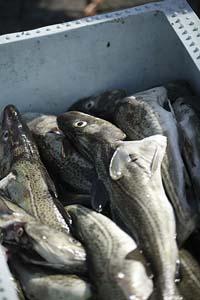Cod trained to be captured

A group of researchers from Iceland propose the formation of fish as a sustainable fishing technique.
A group of biologists from the Reykjavik Marine Research Institute have investigated a fishing technique based on formed fish and concluded that it can be sustainable. Fish --cod, in the case of this research-, despite being free at sea, train to go to specific areas, to specific food stations, and only fish in them. In this way, only specimens of a certain size are caught and other species that currently fall into the nets along with the cod are avoided.
However, this type of fishing has sparked controversy. In the United States, an investigation was initiated to unite the cods using underwater sounds, but the Food & Water Watch organization sued the researchers and had to suspend the initial investigation. There have also been discussions about fish ownership. Many experts say that the training technique used by Icelandic researchers is different from that used previously, and that it is only about attracting cod through food. However, they say it will not be easy for the fishing technique proposed by the research to become a common practice. The economic results must be very good for the fishing industry, the scientific community and the authorities to take a favorable technical stance.





